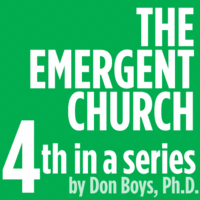Emergent Churches Are Kingdom Builders!
[an error occurred while processing this directive]Edit page New page Hide edit links
Brian McLaren refers to the kingdom incessantly in his book and someone needs to remind him what Jesus said in John 18:36: “My kingdom is not of this world.” Brian spends 237 pages to convince us that we can bring the kingdom NOW if we become wimpy, worldly, wacko “emergent” Christians. Frankly, I would rather fight than switch.
Some facts about the Kingdom: When John the Baptist came on the scene he preached, “Repent for the Kingdom of Heaven is at hand.” When John introduced Christ, He began to preach the same message and began to heal the sick. In Matt. 5, He also added “Blessed are the poor in spirit: for theirs is the kingdom of Heaven.” Continuing, He said, “Blessed are they which are persecuted for righteousness’ sake: for theirs is the kingdom of heaven. Christ then promised that those who preach His commandments—and practice them shall be “called great in the kingdom of Heaven.” Christ then warned that those people whose righteousness does not exceed that of the scribes and Pharisees would not enter into the Kingdom of Heaven.
Evidently, the Kingdom was not yet come because His sample prayer was “Thy kingdom come. Thy will be done in earth, as it is in heaven.” He tells us in Matt. 6:33 to seek the kingdom of God above everything and everything else will be added to us.
Christ then tells us that we must experience conversion and become like a child to enter into the kingdom of heaven. In fact, those with the humility of a child are the “greatest in the kingdom of heaven.” Christ said that the “kingdom of God is within you,” probably meaning that it was among them even then. The thief on the cross asked to be remembered when “thou comest into thy kingdom.”
He finally said that His kingdom was not of this world. I have looked in vain for a command to bring in the kingdom or to sacrifice the message of the cross for a social action message. As individuals, we are to be Christ-like and help the poor, feed the hungry, seek justice for the lowly, etc., but that is not the message of the church or the focus of Christians. The cross, it’s always the cross, not a social gospel since that is only temporary and cannot save.
EC leaders seem to be hung up on the Kingdom and that always seems to be where they return. Repeatedly they disparage, discredit, deride, disdain, and even deny the conversion experience. They sneer at those who tell sinners to “recognize sin, repent of sin, and receive the Savior” and they treat the Romans Road the same way. Their road takes them to the kingdom, but they are fuzzy as to what kingdom. None of the leaders to my knowledge is clear as to what they mean other than to implement some of the Sermon of the Mount. Alan Jones declared, “ ‘The Kingdom’ is a sort of shorthand signifying an inclusive community of faith, love and justice.” (Reimagining Christianity, p. 12.)
“Kingdom” is used many times in the Old Testament; however it is used in a prophetic way in Daniel 2:44, “And in the days of these kings shall the God of heaven set up a kingdom, which shall never be destroyed…and it shall stand for ever.” This, I think, is God’s kingdom on earth established at the coming of Christ—the Kingdom of Heaven. It is not here yet. The Kingdom of Heaven is mentioned only in the book of Matthew—that most Bible teachers admit focuses on the Jews.
Paul, in II Tim. 4:1 says, “I charge thee therefore before God, and the Lord Jesus Christ, who shall judge the quick and the dead at his appearing and his kingdom….” then in verse 18 he adds, “And the Lord…will preserve me unto his heavenly kingdom.” Evidently, Paul was not yet in that Kingdom since that takes place when Christ returns to reign on the earth. Therefore, the EC people cannot be trying to bring that kingdom unless they think that by implementing the Sermon on the Mount, Christ will decide that the EC people have made the earth so desirable that it will prompt Him to return to establish that kingdom and begin the millennial reign.
The Kingdom of God is obviously reached through the New Birth. Jesus said, “Except a man be born again, he cannot see (nor enter) the kingdom of God.” Therefore, that spiritual experience puts all who trust in Christ into that Kingdom. This aspect is what many EC leaders such as Spencer Burke object to.
Spencer Burke, wrote, “Because of an overdeveloped sense of both heaven and hell, many people’s theology is almost obsessed with our afterlife destination. Christianity is all about getting saved from sin and saved from hell, the punishment for sin. But this is a distortion, or at least a reduction, of the Bible’s notion of salvation.” (Spencer Burke, A Heretics Guide to Eternity, p. 180.)
On page 182, Spencer opined on Christ’s words in John 14:6, “So how do I interpret this particular Scripture? First, Christianity as a religion didn’t exist when Jesus spoke these words. Compounding this point are two additional facts: no one actually recorded Jesus’ words at the time he spoke them, so we have no proof that they are indeed his words, and what he did say, he said in Aramaic, which means that nothing in the Bible as translated into an other language can be taken literally anyway.”
Isn’t that interesting? EC fanatics drool over the words of Christ when He spoke about the meek inheriting the earth, helping the poor, doing good to those who do evil, forgiving our enemies, etc., (all true and applicable to all Christians, although not as the way of salvation) yet we can’t be sure about John 14:6 being the actual words of Christ! Spencer is not thinking straight.
It is obvious from everything I have read about the Emergent Church that they have little confidence, if any, in the Word of God. They have no creeds or firm beliefs and they are “diverse” in liturgy. They run away from absolutes in the Word the way third generation welfare recipients run away from work! They seldom discuss doctrinal truth since that is too binding, rigid, divisive, and threatening. No one can argue or be angry with one for expressing his “feelings,” “concerns,” and “thoughts.” That is very safe and may produce “conversation” but never confrontation or conflict. Moreover, it will not produce conversion and commitment to Christ.


More from Church Growth Movement
(Audio) Don Boys, Ph.D. preaching on “What’s Emerging from the Emergent Church?”
Brian McLaren, recognized as the major leader of the Emergent Church, …characterizes himself as “a missional, evangelical, post/protestant, liberal/conservative, mystical/poetic, biblical, charismatic/contemplative, fundamentalist/calvinist, anabaptist/anglican, methodist, catholic, green, incarnational, depressed-yet-hopeful, emergent, unfinished Christian.”
It is obvious that many evangelical leaders do not want to be “put on the spot” especially when they are asked to take a position that embarrasses their friends or supporters.
Ken Blanchard, an Emergent Church leader wrote, “Does Buddha have anything to offer non-Buddhists in the work place? My answer is a wholehearted, ‘Yes.’”
There can be no argument the EC leaders emphasize the environment over eternity.


Comments
1 comment(s) on this page. Add your own comment below.
I would like to question the point made about Matthew 6:33- if the Kingdom of God is something that can only be found in heaven, what is the point of seeking it whilst on earth? I believe that the kingdom of God is something that can be found both on earth and in heaven; it is found wherever God is acknowledged, treated and honoured fully as king. The story in Mark 12:28-34 makes sense when we see that the teacher in this story is close to making God the Lord of all his life, and therefore not far from the kingdom.
Jesus said in John 10:10 that He came to give life in all its fullness. I don’t see homelessness, hunger, poverty or suffering as part of having a full life, which is why a focus on social action AS WELL AS a focus on the good news of eternal life is far closer to the original Biblical truth than either of the positions on their own. Again, the kingdom of God is shown to be one where those who are well-off, rich and powerful serve those who have nothing- Matthew 18 is a teaching about humility in the kingdom of God, so I see no reason why it cannot be a kingdom on earth as well as in heaven. Jesus knows that He cannot speed up the timing of the apocalypse and the coming of the new heaven and the new earth- why would He pray ‘Your Kingdom come and Your will be done on earth as it is in heaven?’ if He were not referring to the kingdom of God coming on earth in the lives of His children?
I count myself as a born again Christian who cares about people and their welfare in this world as well as the next- I believe that Jesus’ words in John 14:6 are absolutely true and that there is an urgent need to bring people to know Christ. But I also believe that Jesus can make this temporal world a better place, and I see that there is a way of mixing the two in making God the Lord of my life and thus bringing about His “Kingdom” in my life.
Also, I’m not sure that confrontation or conflict are good things, and I don’t believe that they bring people any closer to knowing Jesus than conversations do.
Add a Comment
Please be civil.